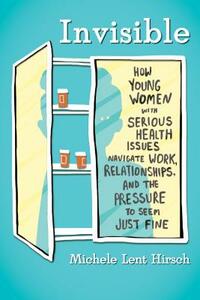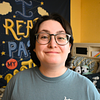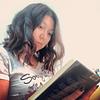Take a photo of a barcode or cover
hopeful
informative
fast-paced
Yikes. This book did not live up to its description at all. I felt like we got only a little bit about women with serious health issues, and lots about mistreatment of minorities, able-bodied women, and trans people. There was almost a whole chapter on docs who sexually abuse and other meanderings. All worthy topics, but not the reason I picked up this book. Stars are for the sections that actually fit the summary. In addition, this author was wildly inconsistent and contradictory. She’s clearly working through a lifetime of her own issues, and good for her, but this was not meant to be a memoir. Kind of felt like one big, passionate rant against the medical industry that at times hit good points. I wanted to read the book this title promised. .
informative
medium-paced
This is part memoir about Michele Lent Hirsch’s struggles with her interactions and relationships with others and the medical field while having invisible illness as well as stories from many women she has interviewed. I learned a lot reading this book.
I related to so much in this and want to shove it into the hands of everyone I meet. Being young and sick and a woman has so many challenges people don't even consider. This book broke it down by interviewing women (cis and trans) of all backgrounds and made me feel SEEN and connected to others out there dealing with the same shit.
I also appreciated how inclusive this is. It talks about the specific challenges women with illnesses face if they are queer or poor or part of any other marginalized group. It's so good to have a true exploration of the many layers of issues there are when people think you're "too young" to be sick.
I also appreciated how inclusive this is. It talks about the specific challenges women with illnesses face if they are queer or poor or part of any other marginalized group. It's so good to have a true exploration of the many layers of issues there are when people think you're "too young" to be sick.
Part memoir, part anecdote, and part research, Invisible does an amazing job looking at women society deems "too young" or "too pretty" to be sick.
The good:
- The book is own voices for both health issues and being queer, which is awesome in its own right, and her conscientious efforts mean...
- ...it may be the most intersectional book I've ever read. Lent Hirsch mentions how each woman interviewed identifies and the range across race, sexuality, religion, and gender is amazing. She goes into how each of these identities affect how a woman interacts with health care as well as friends, family, coworkers, and romantic partners.
- This care is reflected in own voices reviews for Invisible. My favorite is by Corvus who identifies as Queer, trans, and disabled. They write, "This is the first book of this kind that I have read - that was not specifically about LGBTQ populations - that didn't let me down." Their whole review is wonderful, go check it out here.
- There's a thoughtful discussion with several people about using the word "disability" in relation to themselves, and why they do or don't embrace it. There are many answers to this question and I like how so many different angles are covered.
- Large sections of the text are straight from discussions the author had with women of all sorts. While reading I thought - if a straight cis white man wrote this book he would only grab the juiciest quotes and summarize the rest through the lens of his own experience. Lent Hirsch, however, has each amazing woman speak for herself and the book is stronger for it.
- Even though my own experience as a patient is thankfully limited there are still parts that hit close to home.
The not-so-great:
- Only one thing here - I would have liked the 30,000 foot level writing to be stronger. There are themes that could have been developed to make the book gel as a cohesive whole and their lack feels like a lost opportunity.
Invisible is an insightful look at what women of all sorts go through while dealing with chronic illness. It's a must read if you have any tiny bit of interest in the subject - I loved it.
Thanks to Beacon Press and Edelweiss for providing a review copy.
The good:
- The book is own voices for both health issues and being queer, which is awesome in its own right, and her conscientious efforts mean...
- ...it may be the most intersectional book I've ever read. Lent Hirsch mentions how each woman interviewed identifies and the range across race, sexuality, religion, and gender is amazing. She goes into how each of these identities affect how a woman interacts with health care as well as friends, family, coworkers, and romantic partners.
- This care is reflected in own voices reviews for Invisible. My favorite is by Corvus who identifies as Queer, trans, and disabled. They write, "This is the first book of this kind that I have read - that was not specifically about LGBTQ populations - that didn't let me down." Their whole review is wonderful, go check it out here.
- There's a thoughtful discussion with several people about using the word "disability" in relation to themselves, and why they do or don't embrace it. There are many answers to this question and I like how so many different angles are covered.
- Large sections of the text are straight from discussions the author had with women of all sorts. While reading I thought - if a straight cis white man wrote this book he would only grab the juiciest quotes and summarize the rest through the lens of his own experience. Lent Hirsch, however, has each amazing woman speak for herself and the book is stronger for it.
- Even though my own experience as a patient is thankfully limited there are still parts that hit close to home.
"The new pharmacist was great. He never commented on my looks or how my body made him feel. What a low bar I was holding him to: he was 'great' because he didn't harass me.
The not-so-great:
- Only one thing here - I would have liked the 30,000 foot level writing to be stronger. There are themes that could have been developed to make the book gel as a cohesive whole and their lack feels like a lost opportunity.
Invisible is an insightful look at what women of all sorts go through while dealing with chronic illness. It's a must read if you have any tiny bit of interest in the subject - I loved it.
Thanks to Beacon Press and Edelweiss for providing a review copy.
slow-paced
challenging
emotional
informative
reflective
fast-paced
A must read!!!
Graphic: Ableism, Body shaming, Cancer, Mental illness, Racism, Rape, Sexual assault, Medical content, Medical trauma, Pregnancy
Moderate: Drug use, Fatphobia, Transphobia
Infertility and harassment,
This book is SO good. As a young woman with chronic pain / chronic illness / disability, I found it so very relatable and relevant to my daily life. I felt like I was highlighting a good half of the book! But while the book was hard to put down, I could also only read the book in chunks, because I would get all full of righteous indignation and social justice feels. Definitely not a relaxing before bed book. Lent Hirsch does a really great job of working to be intersectional in her analysis. She brings in many queer, trans, and POC narratives and points out straight/cis/white/thin/class privilege. This book felt affirming and energizing. Though it catalogues the many depressing and heavy social/institutional obstacles in our way, it feels hopeful. Hopeful because people like Lent Hisch are speaking out their lived experience, advocating for themselves and others, and demanding better from society.
challenging
emotional
inspiring
reflective
medium-paced
Heartbreaking stories that despite it all inspire and need to be told so this stops happening!!! How are some of those still happening is beyond me






